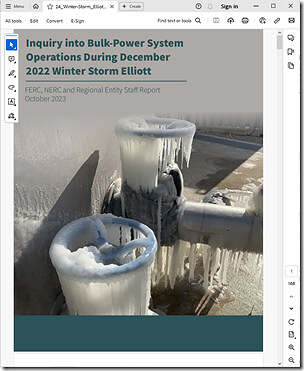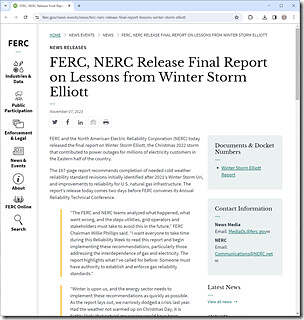In Australia we’re in the midst of summer 2023-24.
1) apart from two hot-and-high-demand days in Queensland on Thu 28th Dec 2023 and Fri 29th Dec 2023, this summer’s been turning out significantly differently than I had expected when the BOM declared that El Niño and a positive Indian Ocean Dipole (IOD) were underway in September 2023.
2) Shows the complexities involved in (understanding of) complex weather patterns!
On (one part of) the other side of the world, in North America they are experiencing winter 2023-24. From afar we’ve been watching a steady stream of updates about various challenges, including:
1) Rolling load shedding in Hawaii about a week ago;
2) Very tight supply-demand balance in Alberta in the past couple days; and
3) Another round of concerns about supply-demand balance in Texas;
…. plus more
Each of these locations seems to possess their own series of commentators who are positing a variety of views about the extent to which the various local efforts to manage the energy transition is exacerbating (or not) these supply-demand challenges.
Which reminds me that some of our readers pointed out back in November 2023 that FERC released its Final Report on lessons from ‘Winter Storm Elliott’ … the Christmas 2022 storm that contributed to power outages for millions of electricity customers in the Eastern half of the country:
| Final Report
Lessons from Winter Storm Elliott (168 pages)
|
Media Release |
|
You can download the main document as PDF from here: A few key pieces of information in the report: ‘From December 21 to 26, 2022, in the Event Area, a total of 1,702 individual generating units—47 percent natural gas-fired, 21 percent wind, 12 percent coal, 3 percent solar, 0.4 percent nuclear, 17 percent other (oil, hydroelectric and biomass)—experienced 3,565 outages, derates, or failures to start Ninety-six percent of all outages, derates, and failuresto start were attributed to three causes: Freezing Issues (31 percent), Fuel Issues (24 percent) and Mechanical/ Electrical Issues (41 percent). Of those outages, derates, and failures to start, 55 percent were caused by either Freezing Issues or Fuel Issues, as shown in Figure 7 below. Natural Gas Fuel Issues (a subset, but the majority, of Fuel Issues) were 20 percent of all causes, and issues with other fuels were four percent. In addition to the outages, derates, and failures to start caused by Freezing Issues, those caused by Mechanical/ Electrical Issues also indicated a clear pattern related to cold temperatures—as temperatures decreased, the number of generating units experiencing an outage, derate or failure to start due to Mechanical/Electrical Issues increased. (p19-20/168 in the PDF) … and in terms of recommendations … ‘the Team urges prompt development and implementation of the remaining revisions to the Reliability Standards recommended … and more … ’ (p21/168 in the PDF)
|
There’s more information in this News Release from FERC: This includes the quote:
|
Our readers (both in Australia and elsewhere) might like to read through this report in parallel with what’s currently happening …




Be the first to comment on "In November 2023, FERC released Final Report on lessons from Winter Storm Elliott (the Christmas 2022 storm)"